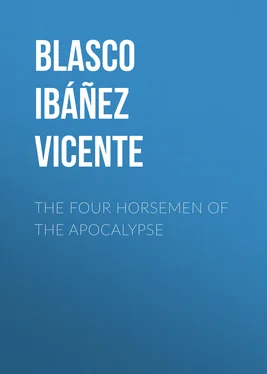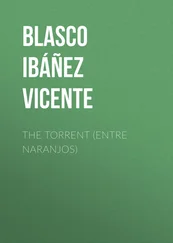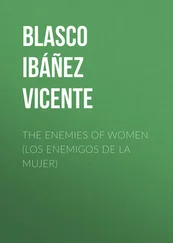Vicente Blasco Ibáñez - The Four Horsemen of the Apocalypse
Здесь есть возможность читать онлайн «Vicente Blasco Ibáñez - The Four Horsemen of the Apocalypse» — ознакомительный отрывок электронной книги совершенно бесплатно, а после прочтения отрывка купить полную версию. В некоторых случаях можно слушать аудио, скачать через торрент в формате fb2 и присутствует краткое содержание. Жанр: foreign_prose, foreign_antique, на английском языке. Описание произведения, (предисловие) а так же отзывы посетителей доступны на портале библиотеки ЛибКат.
- Название:The Four Horsemen of the Apocalypse
- Автор:
- Жанр:
- Год:неизвестен
- ISBN:нет данных
- Рейтинг книги:3 / 5. Голосов: 1
-
Избранное:Добавить в избранное
- Отзывы:
-
Ваша оценка:
- 60
- 1
- 2
- 3
- 4
- 5
The Four Horsemen of the Apocalypse: краткое содержание, описание и аннотация
Предлагаем к чтению аннотацию, описание, краткое содержание или предисловие (зависит от того, что написал сам автор книги «The Four Horsemen of the Apocalypse»). Если вы не нашли необходимую информацию о книге — напишите в комментариях, мы постараемся отыскать её.
The Four Horsemen of the Apocalypse — читать онлайн ознакомительный отрывок
Ниже представлен текст книги, разбитый по страницам. Система сохранения места последней прочитанной страницы, позволяет с удобством читать онлайн бесплатно книгу «The Four Horsemen of the Apocalypse», без необходимости каждый раз заново искать на чём Вы остановились. Поставьте закладку, и сможете в любой момент перейти на страницу, на которой закончили чтение.
Интервал:
Закладка:
Her other four sons would become officers. Their father was preparing the ground so that they might enter the Guard or some aristocratic regiment without any of the members being able to vote against their admission. The two daughters would surely marry, when they had reached a suitable age with officers of the Hussars whose names bore the magic “von” of petty nobility, haughty and charming gentlemen about whom the daughter of Misia Petrona waxed most enthusiastic.
The establishment of the Hartrotts was in keeping with these new relationships. In the home in Berlin, the servants wore knee-breeches and white wigs on the nights of great banquets. Karl had bought an old castle with pointed towers, ghosts in the cellars, and various legends of assassinations, assaults and abductions which enlivened its history in an interesting way. An architect, decorated with many foreign orders, and bearing the title of “Councillor of Construction,” was engaged to modernize the mediaeval edifice without sacrificing its terrifying aspect. The Romantica described in anticipation the receptions in the gloomy salon, the light diffused by electricity, simulating torches, the crackling of the emblazoned hearth with its imitation logs bristling with flames of gas, all the splendor of modern luxury combined with the souvenirs of an epoch of omnipotent nobility—the best, according to her, in history. And the hunting parties, the future hunting parties! . . . in an annex of sandy and loose soil with pine woods—in no way comparable to the rich ground of their native ranch, but which had the honor of being trodden centuries ago by the Princes of Brandenburg, founders of the reigning house of Prussia. And all this advancement in a single year! . . .
They had, of course, to compete with other oversea families who had amassed enormous fortunes in the United States, Brazil or the Pacific coast; but these were Germans “without lineage,” coarse plebeians who were struggling in vain to force themselves into the great world by making donations to the imperial works. With all their millions, the very most that they could ever hope to attain would be to marry their daughters with ordinary soldiers. Whilst Karl! . . . The relatives of Karl! . . . and the Romantica let her pen run on, glorifying a family in whose bosom she fancied she had been born.
From time to time were enclosed with Elena’s effusions brief, crisp notes directed to Desnoyers. The brother-in-law continued giving an account of his operations the same as when living on the ranch under his protection. But with this deference was now mixed a badly concealed pride, an evident desire to retaliate for his times of voluntary humiliation. Everything that he was doing was grand and glorious. He had invested his millions in the industrial enterprises of modern Germany. He was stockholder of munition factories as big as towns, and of navigation companies launching a ship every half year. The Emperor was interesting himself in these works, looking benevolently on all those who wished to aid him. Besides this, Karl was buying land. At first sight, it seemed foolish to have sold the fertile fields of their inheritance in order to acquire sandy Prussian wastes that yielded only to much artificial fertilizing; but by becoming a land owner, he now belonged to the “Agrarian Party,” the aristocratic and conservative group par excellence, and thus he was living in two different but equally distinguished worlds—that of the great industrial friends of the Emperor, and that of the Junkers, knights of the countryside, guardians of the old traditions and the supply-source of the officials of the King of Prussia.
On hearing of these social strides, Desnoyers could not but think of the pecuniary sacrifices which they must represent. He knew Karl’s past, for on the ranch, under an impulse of gratitude, the German had one day revealed to the Frenchman the cause of his coming to America. He was a former officer in the German army, but the desire of living ostentatiously without other resources than his salary, had dragged him into committing such reprehensible acts as abstracting funds belonging to the regiment, incurring debts of honor and paying for them with forged signatures. These crimes had not been officially prosecuted through consideration of his father’s memory, but the members of his division had submitted him to a tribunal of honor. His brothers and friends had advised him to shoot himself as the only remedy; but he loved life and had fled to South America where, in spite of humiliations, he had finally triumphed.
Wealth effaces the spots of the past even more rapidly than Time. The news of his fortune on the other side of the ocean made his family give him a warm reception on his first voyage home; introducing him again into their world. Nobody could remember shameful stories about a few hundred marks concerning a man who was talking about his father-in-law’s lands, more extensive than many German principalities. Now, upon installing himself definitely in his country, all was forgotten. But, oh, the contributions levied upon his vanity . . . Desnoyers shrewdly guessed at the thousands of marks poured with both hands into the charitable works of the Empress, into the imperialistic propagandas, into the societies of veterans, into the clubs of aggression and expansion organized by German ambition.
The frugal Frenchman, thrifty in his expenditures and free from social ambitions, smiled at the grandeurs of his brother-in-law. He considered Karl an excellent companion although of a childish pride. He recalled with satisfaction the years that they had passed together in the country. He could not forget the German who was always hovering around him, affectionate and submissive as a younger brother. When his family commented with a somewhat envious vivacity upon the glories of their Berlin relatives, Desnoyers would say smilingly, “Leave them in peace; they are paying very dear for their whistle.”
But the enthusiasm which the letters from Germany breathed finally created an atmosphere of disquietude and rebellion. Chichi led the attack. Why were they not going to Europe like other folks? all their friends had been there. Even the Italian and Spanish shopkeepers were making the voyage, while she, the daughter of a Frenchman, had never seen Paris! . . . Oh, Paris. The doctors in attendance on melancholy ladies were announcing the existence of a new and terrible disease, “the mania for Paris.” Dona Luisa supported her daughter. Why had she not gone to live in Europe like her sister, since she was the richer of the two? Even Julio gravely declared that in the old world he could study to better advantage. America is not the land of the learned.
Infected by the general unrest, the father finally began to wonder why the idea of going to Europe had not occurred to him long before. Thirty-four years without going to that country which was not his! . . . It was high time to start! He was living too near to his business. In vain the retired ranchman had tried to keep himself indifferent to the money market. Everybody was coining money around him. In the club, in the theatre, wherever he went, the people were talking about purchases of lands, of sales of stock, of quick negotiations with a triple profit, of portentous balances. The amount of money that he was keeping idle in the banks was beginning to weigh upon him. He finally ended by involving himself in some speculation; like a gambler who cannot see the roulette wheel without putting his hand in his pocket.
His family was right. “To Paris!” For in the Desnoyers’ mind, to go to Europe meant, of course, to go to Paris. Let the “aunt from Berlin” keep on chanting the glories of her husband’s country! “It’s sheer nonsense!” exclaimed Julio who had made grave geographical and ethnic comparisons in his nightly forays. “There is no place but Paris!” Chichi saluted with an ironical smile the slightest doubt of it—“Perhaps they make as elegant fashions in Germany as in Paris? . . . Bah!” Dona Luisa took up her children’s cry. “Paris!” . . . Never had it even occurred to her to go to a Lutheran land to be protected by her sister.
Читать дальшеИнтервал:
Закладка:
Похожие книги на «The Four Horsemen of the Apocalypse»
Представляем Вашему вниманию похожие книги на «The Four Horsemen of the Apocalypse» списком для выбора. Мы отобрали схожую по названию и смыслу литературу в надежде предоставить читателям больше вариантов отыскать новые, интересные, ещё непрочитанные произведения.
Обсуждение, отзывы о книге «The Four Horsemen of the Apocalypse» и просто собственные мнения читателей. Оставьте ваши комментарии, напишите, что Вы думаете о произведении, его смысле или главных героях. Укажите что конкретно понравилось, а что нет, и почему Вы так считаете.











